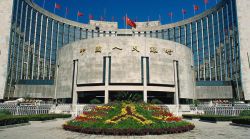Difference between revisions of "People's Bank of China"
imported>Ciic |
imported>Ciic |
||
| Line 1: | Line 1: | ||
[[file: pboc.JPEG|thumb|250px|People's Bank of China]] | [[file: pboc.JPEG|thumb|250px|People's Bank of China]] | ||
| − | The | + | The '''People's Bank of China''' ('''PBOC''' '''中国人民银行''') was established on December 1, 1948 based on the consolidation of the Huabei Bank, the Beihai Bank and the Xibei Farmer Bank. In September 1983, the State Council decided to have the PBC function as a central bank. The Law of the People's Republic of China on the People's Bank of China adopted on March 18, 1995 by the 3rd Plenum of the 8th National People's Congress has since legally confirmed the PBC's central bank status. |
| + | |||
| + | With the improvement of the socialist market economic system, the PBC, as a central bank, will play an even more important role in China's macroeconomic management. The amended Law of the Pople's Republic of China on the People's Bank of China, adopted by the 6th meeting of the Standing Committee of the 10th National People's Congress on December 27, 2003, provides that the PBC performs the following major functions: | ||
| − | + | (1) Drafting and enforcing relevant laws, rules and regulations that are related to fulfilling its functions; | |
| + | |||
| + | (2) Formulating and implementing monetary policy in accordance with law; | ||
| + | |||
| + | (3) Issuing the Renminbi and administering its circulation; | ||
| + | |||
| + | (4) Regulating financial markets, including the inter-bank lending market, the inter-bank bond market, foreign exchange market and gold market; | ||
| + | |||
| + | (5) Preventing and mitigating systemic financial risks to safeguard financial stability; | ||
| + | |||
| + | (6) Maintaining the Renminbi exchange rate at adaptive and equilibrium level; Holding and managing the state foreign exchange and gold reserves; | ||
| + | |||
| + | (7) Managing the State treasury as fiscal agent; | ||
| + | |||
| + | (8) Making payment and settlement rules in collaboration with relevant departments and ensuring normal operation of the payment and settlement systems; | ||
| + | |||
| + | (9) Providing guidance to anti-money laundering work in the financial sector and monitoring money-laundering related suspicious fund movement; | ||
| + | |||
| + | (10) Developing statistics system for the financial industry and responsible for the consolidation of financial statistics as well as the conduct of economic analysis and forecast | ||
| + | |||
| + | (11) Administering credit reporting industry in China and promoting the building up of credit information system; | ||
| + | |||
| + | (12) Participating in international financial activities at the capacity of the central bank; | ||
| + | |||
| + | (13) Engaging in financial business operations in line with relevant rules; | ||
| + | |||
| + | (14) Performing other functions prescribed by the State Council. | ||
[[Category: Ministries]] | [[Category: Ministries]] | ||
| + | [[Category: Banks]] | ||
Revision as of 04:50, 19 July 2013
The People's Bank of China (PBOC 中国人民银行) was established on December 1, 1948 based on the consolidation of the Huabei Bank, the Beihai Bank and the Xibei Farmer Bank. In September 1983, the State Council decided to have the PBC function as a central bank. The Law of the People's Republic of China on the People's Bank of China adopted on March 18, 1995 by the 3rd Plenum of the 8th National People's Congress has since legally confirmed the PBC's central bank status.
With the improvement of the socialist market economic system, the PBC, as a central bank, will play an even more important role in China's macroeconomic management. The amended Law of the Pople's Republic of China on the People's Bank of China, adopted by the 6th meeting of the Standing Committee of the 10th National People's Congress on December 27, 2003, provides that the PBC performs the following major functions:
(1) Drafting and enforcing relevant laws, rules and regulations that are related to fulfilling its functions;
(2) Formulating and implementing monetary policy in accordance with law;
(3) Issuing the Renminbi and administering its circulation;
(4) Regulating financial markets, including the inter-bank lending market, the inter-bank bond market, foreign exchange market and gold market;
(5) Preventing and mitigating systemic financial risks to safeguard financial stability;
(6) Maintaining the Renminbi exchange rate at adaptive and equilibrium level; Holding and managing the state foreign exchange and gold reserves;
(7) Managing the State treasury as fiscal agent;
(8) Making payment and settlement rules in collaboration with relevant departments and ensuring normal operation of the payment and settlement systems;
(9) Providing guidance to anti-money laundering work in the financial sector and monitoring money-laundering related suspicious fund movement;
(10) Developing statistics system for the financial industry and responsible for the consolidation of financial statistics as well as the conduct of economic analysis and forecast
(11) Administering credit reporting industry in China and promoting the building up of credit information system;
(12) Participating in international financial activities at the capacity of the central bank;
(13) Engaging in financial business operations in line with relevant rules;
(14) Performing other functions prescribed by the State Council.
